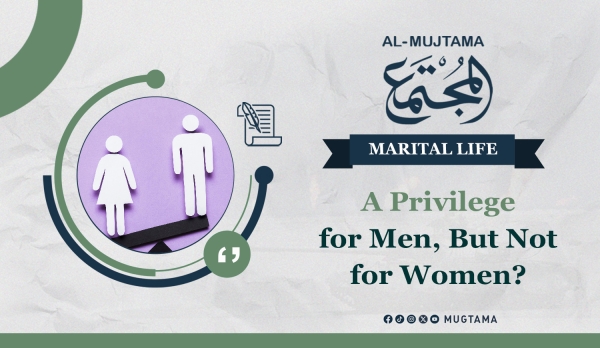A Sudanese Muslim woman residing in Spain married a Christian man after he embraced Islam at her request. They later had three children. However, after several years, she discovered that he was still following his original faith and was secretly attending church, even taking their eldest son with him!
Another woman married a Christian man in a civil court and lived with him for 20 years. During their marriage, she gave birth to seven children. After their separation, the children were given the freedom to choose their religion. Some embraced Islam, while two daughters were baptized after reaching adulthood and married Christian men. As a result, they cut ties with their Muslim sister, leading to a heartbreaking family divide!
These are not just passing stories but real and painful experiences. They serve as a clear response to those who relentlessly accuse Islam of injustice for not granting Muslim women the right to marry non-Muslim men. How can a woman marry someone who does not share her faith and beliefs? How can she leave her children exposed to deviation and loss? How can she feel safe with a man who does not believe in Allah? The consequences faced by those who disregarded Allah’s commandments have been devastating, they have lost themselves and their children, and they now deeply regret their decisions. But alas, regret comes too late!
Make Your Homes a Sacred Sanctuary
Marriage of a Muslim Man to a Kitabiyah (From the People of the Book) Woman and Its Conditions
Even the marriage of a Muslim man to a Kitabiyah woman is not left unrestricted. Islamic law has set clear conditions for such a marriage to ensure the preservation of the Muslim family's identity and to prevent any negative impact on the husband’s faith or the children's upbringing.
The Kitabiyah woman whom a Muslim man is permitted to marry must be chaste. Additionally, the man himself must have a strong religious commitment and exert significant influence over his wife and children to prevent himself from being influenced by her faith. If a Muslim man fears that his wife’s beliefs or culture might negatively impact the stability of his household, Islamic scholars have stated that such a marriage is makruh (discouraged).
Furthermore, marrying a Kitabiyah woman should not lead to a Muslim man’s assimilation into non-Muslim cultures, particularly in Western societies where non-Muslims are the majority. This permission is not arbitrary; it is granted because a Muslim man also believes in the Prophets Moses and Jesus (peace be upon them) and is commanded by his faith to respect other religions and not prevent his wife from practicing her religious rituals.
Moreover, he is the head of the household and is responsible for raising his children according to Islamic teachings. The children are also legally attributed to their father, ensuring that they remain within the fold of Islam. For these reasons, a Muslim man's marriage to a Kitabiyah does not pose a direct threat to the Islamic identity of his family.
However, despite these allowances, American scholar Dr. Yasir Qadhi has stated that he does not believe that a Muslim man’s marriage to a Kitabiyah in these lands (meaning the United States and similar countries) is permissible. This is because, in majority of times, the children of these unions do not remain Muslims!
The Prohibition of a Muslim Woman Marrying a Non-Muslim
Islam has strictly prohibited a Muslim woman from marrying a non-Muslim man, whether he is from the People of the Book (Christian or Jewish) or a polytheist. This prohibition is explicitly stated in the Quran: “And do not marry polytheistic men [to your women] until they believe.” (Al-Baqarah: 221) Islamic scholars unanimously agree that this ruling applies to all non-Muslims, whether they are from the People of the Book or not. The primary objective of Islamic Sharia is to safeguard the faith of the family and prevent it from being lost.
Marriage is a bond based on love and mercy, as Allah states: “And of His signs is that He created for you from yourselves mates that you may find tranquility in them, and He placed between you affection and mercy.” (Ar-Rum: 21) So how can a woman find comfort and tranquility with a husband who does not share her faith?
The Wisdom Behind Such Prohibition
Islam places utmost importance on protecting the Muslim family and ensuring its religious and social stability. Therefore, the authority (qawwamah) in a marriage has been placed in the hands of the husband, as Allah states: “Men are in charge of women by [right of] what Allah has given one over the other and what they spend [for maintenance] from their wealth.” (An-Nisa: 34)
If a Muslim woman were to marry a non-Muslim man, he would have authority over her. This could lead to restrictions on her religious practices or influence the religious beliefs of their children. Consequently, the children’s Islamic identity would be at risk, or at the very least, they would not be adequately nurtured in the faith due to the absence of a strong parental role model. Even if the children were left free to choose their beliefs, they would lack the necessary religious foundation to make the right choice.
Furthermore, Islam is deeply concerned with preserving a woman’s Islamic identity and protecting her faith. A woman is naturally inclined to be influenced by her husband, which could lead to the weakening of her religious commitment or cause her to abandon certain Islamic teachings. A non-Muslim husband may also not respect the Islamic rulings concerning his wife, such as the requirement for her to wear the hijab, creating a psychological and social conflict for her, caught between pleasing her husband and adhering to her faith.
Immigrant Families in Europe: Between Assimilation and Integration
------------------------------------------------------------------------------------
- Mahasin al-Islam Encyclopedia
- Aluka.net
- Islamweb
- “Family in Islam,” by Muhammad Abu Zahra


